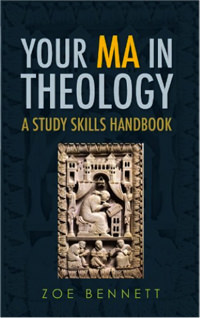26th April, 2016
Zoë Bennett
Your MA in Theology: A Study Skills Handbook
SCM Press, London, 2014
ISBN-13: 978-0334044918
 |
|
"Your MA in Theology is Bennett’s concise and readable handbook filled with practical advice on what master’s level theological study involves and requires." |
Graduate level theological study requires a new set of skills that do not necessarily come intuitively. Students can study the information and content of individual theology units or even courses, without picking up the study skills and broader theological framework that help them make the most of the experience. Some initial tutoring in foundational skills can help set students up for greater success.
Zoë Bennett is a master teacher and Anglia Ruskin University’s director of postgraduate studies in pastoral theology. Over the last two decades, she has developed and coordinated MA and professional doctorate courses, and is at her best helping students make the most of practical theology study and supervising their research.
Your MA in Theology is Bennett’s concise and readable handbook filled with practical advice on what master’s level theological study involves and requires. It is helpful to understand what is expected at this level of study – a certain level of in-depth knowledge and understanding, generic abilities in problem solving and independent research, but not the same depth and originality that a doctorate expects. Bennett introduces her readers to practical guidelines for reading, note-taking, academic writing, planning and structuring assignments, participating in seminar groups, setting academic and learning goals, reflection and reflexivity, avoiding plagiarism and developing a scholarly voice.
Bennett explains how to demonstrate ‘mastering’ theology with dozens of helpful suggestions and excellent writing advice, for example:
• aiming to have several serious books in an essay’s bibliography that have been published in the last five years;
• identifying and using the ‘canon’ of writers and thinkers in your field;
• putting the writers you quote into their context
• using primary and secondary sources to support your own argument, not just cobbling together quotes;
• not overusing extended verbatim quotes, and as a rule of thumb discussing any quote for about twice the length of the quotation;
• avoiding ‘we’, ‘need’ and ‘must’ language to stay away from a typically sermon-mode of writing;
• use individual paragraphs to develop each new point; and,
• always asking and communicating clearly the ‘why’ and ‘so what’ in essays.
Bennett devotes a chapter to the challenges of international students and their adjustments particularly to her British educational system. She has also teamed up with Carol Reckie’s librarian expertise to guide students to the best resources, and Esther Shreeve to offer her insights into learning difficulties.
Another chapter offers invaluable advice for developing a dissertation proposal and project plan. Ideally a thesis or dissertation is not just about writing something but exploring and finding something out. Bennett guides students through the art of articulating a question, checking if there are appropriate resources, using a conceptual framework, navigating ethics issues, crafting a suitable proposal, and making the most of supervision throughout the process.
One of the most insightful chapters grapples with balancing faith commitment and academic critique – how to develop a ‘hermeneutic of suspicion’ and variety of perspectives while still holding to (or perhaps adapting) appropriate convictions.
Bennett discusses different ways of integrating theory and practice, or (as she prefers to articulate) navigating the tensions between or dialectic of tradition and experience. At this point the book becomes a thoughtful memoir of a scholar’s development as well as offering an overview of different models of theological reflection and reflective practice.
In Bennett’s office is a poster that reads: “Theory is when you understand everything and nothing works. Practice is when everything works but you don’t understand why. Here we have brought the two together: nothing works and no one knows why!” Your MA in Theology takes readers on the opposite path – taking seriously both the experience of faith, and understanding the underlying reasons why. As a handbook it would be an invaluable addition to every theology student and teacher’s desk.
This review was originally published in Crucible Theology Journal 6:3 (November 2015).
FOR MORE ON BOOKS, visit our books page here…
FOR SIGHT’S BOOKSHOP, visit here…






